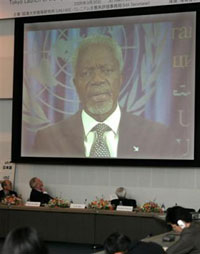 |
| Participants in a meeting on the
Millennium Ecosystem Assessment listen to U.N. Secretary
General Kofi Annan speaks through a video at the U.N.
University in Tokyo Wednesday, March 30, 2005. (AP
Photo/Katsumi
Kasahara) | |
Growing populations and expanding economic
activity have strained the planet's ecosystems over the past half century,
a trend that threatens international efforts to combat poverty and
disease, a U.N.-sponsored study of the Earth's health warned on Wednesday.
The four-year, $24 million Millennium Ecosystem Assessment found humans
have caused heavy damage or depleted portions of the world's farmlands,
forests and watercourses.
Unless nations adopt more eco-friendly policies, increased human
demands for food, clean water and fuels could speed the disappearance of
forests, fish and fresh water reserves and lead to more frequent disease
outbreaks over the next 50 years, it warned.
"This report is essentially an audit of nature's economy and the audit
shows that we have driven most of the accounts into the red," Jonathan Lash, a member of the
Millennium Ecosystem Assessment board, said in London.
The report said degradation of ecosystems was a barrier to achieving
development goals adopted at the U.N. Millennium Summit in Johannesburg,
South Africa in September 2000: halving the proportion of people without
access to clean water and basic sanitation by 2015 and improving the lives
of 100 million slum dwellers
by 2020.
Walter Reid, director of the Millennium Ecosystem Assessment, said over
the past 50 years humans had changed ecosystems more rapidly and
extensively than any comparable period in human history.
"These changes have resulted in a substantial and largely irreversible loss to the biological
diversity of the planet," Reid said.
U.N. Secretary-General Kofi Annan said the Millennium Ecosystem
Assessment "tells us how we can change course," and urged nations to
consider its recommendations.
The study was compiled by 1,360 scientists from 95 nations who pored
over 16,000 satellite photos from the U.S. National Aeronautics and Space
Administration, and analyzed statistics and scientific journals.
Their findings highlight the planet's problems at the end of the 20th
century, as the human population reached 6 billion.
Conservation groups called on governments, businesses and individuals
to heed the study's warnings.
(Agencies) |
本周三(3月30日),联合国主持的一项“地球健康状况”研究活动对人们发出预警:在过去半个世纪中,人口的不断增长和日益繁多的经济活动使地球的生态系统不堪重负,这种趋势向致力于消除贫穷和疾病的国际力量敲响了警钟。
这项历时四年,耗资2400万美元的“千禧生态系统评估”显示,人类对地球上的农田、森林和河道造成了巨大的破坏,其中的部分资源已经衰竭。
报告还警告说,在今后50年内,如果各国不采取更有利于生态环保的政策,人类对食物、净水和燃料的不断需求将加速森林、鱼类和新鲜水资源的消失,并导致疾病更加频繁地爆发。
千禧生态系统评估委员会的成员乔纳森·拉什在伦敦说:“这份报告本质上是对‘自然的经济’的一次审核,结果显示我们的大部分账户上已经出现了赤字。”
报告指出,生态系统的恶化已经阻碍了联合国千禧(地球)峰会(2000年9月在南非约翰内斯堡举行)制定的发展目标:到2015年,使不能获取净水和基本卫生设施的人口比例减半;到2020年,使居住在贫民窟的一亿人的生活得到改善。
“千禧生态系统评估”的负责人沃尔特·里德说,在过去50年中,人类对生态系统的改造比历史上的任何时期都更为迅速而广泛。
里德说:“这些变化导致地球上的生物多样性发生了几乎不可挽回的重大损失。”
联合国秘书长科菲·安南表示,千禧生态系统评估“教我们如何改变事物的发展进程”,并呼吁世界各国认真考虑评估组提出的建议。
这项研究由来自95个国家的1360名科学家协力完成,他们阅览了美国国家航空航天部提供的16000张卫星照片,并对所得数据和一些科研期刊进行了分析。
他们的发现进一步凸显了随着20世纪末地球人口达到60亿,这颗行星出现的种种问题。
各类自然资源保护组织纷纷号召政府、企业和个人对研究提出的警告予以重视。
(中国日报网站译) |
